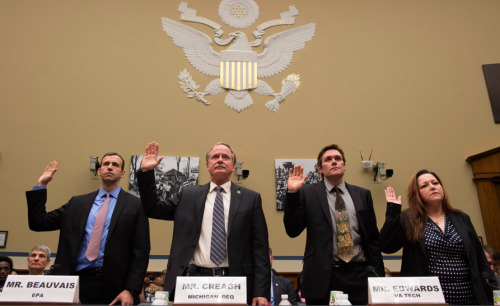When people call the Saturday Six Pack “the most ambitious little program on midwestern micro-watt AM” it’s shows like the one we have coming up this weekend that they’re thinking of. We’re not only going to be joined in the studio by hip-hop artist Jamall Bufford, who will be talking about the new multimedia project he’s currently in the process of creating, called Black Nirvana, and Eastern Michigan University faculty members Judith Kullberg and Howard Bunsis, who will be telling us what happens now that they’ve voted “no confidence” in their Board of Regents, but we’ll also be talking with Flint mother-of-four-turned-activist Lee Anne Walters and Virginia Tech’s Yanna Lambrinidou about their recent testimony before Congress on the subject of the Flint water crisis. To borrow a phrase from Donald Trump, “it’s going to be huge.”
First up will be Bufford, a founding member of the interdisciplinary artist collective known as The Black Opera, with whom we’ll be discusing the group’s most recent project, which they’re hoping to take on the road this coming fall. Described by Bufford as “an earnest expression of music as a weapon for socioeconomic unity,” the ambitious hip-hop stage production, Black Nirvana, will tell the story of young artist in Detroit who, after the tragic death of his brother, creates a doorway through which he can travel through time to different periods of American history. Here, to give you a sense of work, which is being referred to as a “guided social experiment,” is the initial track that set the larger project in motion.
“Through multimedia performance art The Black Opera will cultivate a revival-like energy using prose, rhythm and chorus to engage audience participants in a transcendent voyage to a place of social regeneration.” -The Black Opera
Then, after talking with Bufford, we’ll call Walters, the co-founder of Water You Fighting For?, at her home in Flint. Walters, who, during episode 36 of the Saturday Six Pack, walked us through the events of the last 18 months in Flint, from the first signs of lead poisoning that she began to see in her children, to the point when a sympathetic EPA employee broke protocol and gave her a preliminary study of the toxic water running into her her home, will be talking with us about her recent trip to Washington, DC to testify before Congress. Among other things, we’ll ask what happened behind the scenes, what she was told by members of Congress when the cameras weren’t running, and whether or not she gets the sense that this federal inquiry will actually lead to positive change.
[That’s Walters on the right, standing next to Virginia Tech professor Marc Edwards.]
And, continuing our conversation about the situation in Flint, we’ll then call Yanna Lambrinidou, the President of Parents for Nontoxic Alternatives, who also just testified before Congress about her research and advocacy work around the lead contamination of drinking water. Here, to give you a sense of what we’ll be discussing, is an excerpt from Lambrinidou’s testimony, which not only makes a connection between what is happening today in Flint and what happened a dozen years ago in DC, but suggests that, due the weakening of the EPA’s Lead and Copper Rule, we could see more of the same in the near future.
…Flint and Washington, DC twelve years ago are not outliers. They are canaries in a coalmine. I am not the first to deliver this message. Serious weaknesses in the LCR (Lead and Copper Rule) and evidence of its often suboptimal implementation and enforcement have been noted steadily for the past 12 years in Congressional testimonies, independent governmental and non-governmental investigations, and many media reports.
The LCR is a public health law. It was enacted under the Safe Drinking Water Act (SDWA) of 1974 to protect consumers from lead and copper in drinking water. Yet 25 years after its promulgation, we know this: just in the 4-year period between 2000 and 2004, 274 water utilities exceeded the Rule’s Lead Action Level (LAL) and triggered its remediation requirements.
These exceedances alone placed 11.5 million residents at risk of exposure to lead for weeks, months, and potentially even years.
What separates these cases from Flint and DC, is that in Flint and DC the contamination was first discovered through lead poisoned children and their parents at a time when the utility met federal standards and assured everyone that the water was safe to drink. In Flint, it took 18 months for the problem to be confirmed, not by the City but by Virginia Tech; in the District it took 2.5 years for the problem to be made public, not by the water utility but by the Washington Post.
Subsequently, large-scale health harm was confirmed. When we couple scientific evidence of increased miscarriages, fetal deaths, and elevated blood lead levels among children with documented deficiencies in the LCR’s design, implementation, and enforcement, we are confronted with the harrowing possibility that Flint and DC may have been the “lucky” ones to have gotten caught.
Evidence is mounting that the problem of lead in US drinking water is underestimated and inadequately addressed. Most homes in the country are likely to contain some lead-bearing plumbing – lead solder, leaded brass, a lead service line, or other plumbing components that did not contain lead at first but with time “picked up” lead migrating from other materials. Although all these sources pose a potentially serious health risk to consumers, there is consensus that full and partial lead service lines are the most dangerous. Indeed, current knowledge about these lines ought to give us pause…
And, during our final segment, we’ll be inviting Kulberg and Bunsis back into the studio to bring us up to speed on everything going on at EMU now that the faculty have voted “no confidence” against the Regents, and the Republicans in Lansing have finally agreed to kill the controversial Education Achievement Authority (EAA), which has held EMU hostage these past several years. And I’m sure, if it was anything like our last discussion, during which we spent a great deal of time discussing the growing trend toward corporatization in higher ed, it’ll be great. Here, with a taste of what happened last time that Kulberg and Bunsis were in the studio, is a clip from my writeup about that episode.
…As Kullberg makes clear, this isn’t something that’s just happening at EMU. We’re seeing an increasing loss of public control over institutions across America, she says. “The corporate elite,” says Kullberg, “is finding ways to keep the people out of the process.” They’re systematically decreasing transparency and finding new ways to silence dissent. And that, she and Bunsis argue, is essentially what’s happening at EMU. And this isn’t terribly surprising, given the present makeup of the university’s Board of Regents, who are all political appointees. Seven of EMU’s eight current regents were placed in office by Republican governors, and most of them come from the corporate world… “If we look at the kinds of decisions that the regents have been making,” says Kullberg, “they definitely have a view of the university as a large company”…
So, if you want to find out the current status of EMU’s secret presidential search, or hear what might be coming next, now that the faculty have voted “no confidence” in their Regents, be sure to tune in.
And, here, thanks to AM 1700 senior graphic designer Kate de Fuccio, is this week’s poster, in case any of you want to print copies and distribute them in outside the Governor’s Ann Arbor condo.
FOR THOSE OF YOU WHO HAVE NEVER TUNED IN TO THE SIX PACK BEFORE, HERE ARE THE DETAILS ON HOW TO LISTEN:
Unless you live inside the AM 1700 studio, chances are you won’t be able to pick the show up on your radio. As that’s the case, I’d recommend streaming the show online, which you can do either on the AM1700 website or by way of TuneIn.com.
And for those of you who aren’t yet familiar with the show, and need to get caught up, you can listen to the entire archive on iTunes. If you start right now, and listen to everything at double speed, but you can do it.
One last thing… If you’d like to tell your friends and neighbors about the program, feel free to share the Facebook event listing.
And do call us if you have a chance. We love phone calls. So please copy down this number and slide it into your sock… 734.217.8624… and call us between 6:00 and 8:00 this Saturday evening. The show is nothing without you. Sure, sometimes it’s nothing even with you, that’s true, but usually you make it better.
















6 Comments
If you have a chance, also ask Bufford about his work with Ann Arbor teens at the Neutral Zone. He’s doing good work.
Unrelated to everything, I’m wondering what the rap scene in Flint is like and whether or not hip hop artists are producing good work about the water.
Sounds like a great show!
The timing of this episode is good. News just broke that EMU has a new President.
http://www.freep.com/story/news/local/michigan/2016/02/12/eastern-michigan-university-name-james-smith-next-leader/80283854/
What do we know about this new president? It looks like he was at Bowling Green. Has anyone had interactions with him in the past? I’m pleased that he’s an academic with an interest in education, and not a business person or politician, but I suspect there’s more to the story.
Kim–
https://www.youtube.com/watch?v=X7X9ygv_rO0
https://notsafetodrink.bandcamp.com/